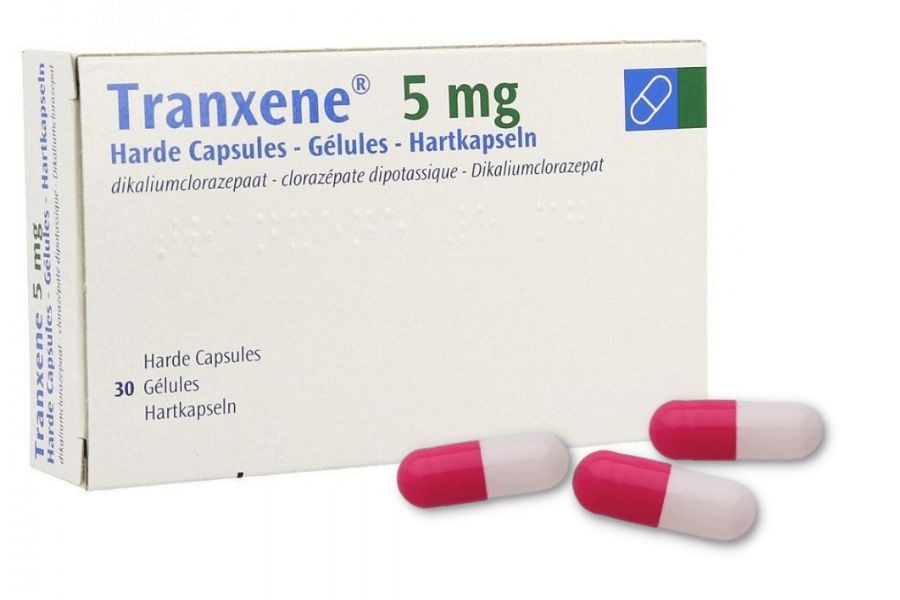
Contents
clorazepate – oral, Tranxene
USES: Clorazepate is used to treat anxiety, acute alcohol withdrawal, and seizures. This medication belongs to a class of drugs called benzodiazepines which act on the brain and nerves (central nervous system) to produce a calming effect. It works by enhancing the effects of a certain natural chemical in the body (GABA).
HOW TO USE: Read the Medication Guide provided by your pharmacist before you start taking clorazepate and each time you get a refill. If you have any questions, ask your doctor or pharmacist. Take this medication by mouth as directed by your doctor. The dosage is based on your age, medical condition, and response to therapy. Use this medication exactly as prescribed. Do not increase your dose, take it more frequently or use it for a longer period of time than prescribed because this drug can be habit-forming. Also, if used for an extended period of time or for seizure control, do not suddenly stop using this drug without your doctor’s approval. Some conditions may become worse when the drug is abruptly stopped. Your dose may need to be gradually decreased. When used for an extended period, this medication may not work as well and may require different dosing. Talk with your doctor if this medication stops working well.
SIDE EFFECTS: Drowsiness, dizziness, fatigue, dry mouth, upset stomach, constipation, blurred vision, or headache may occur. If any of these effects persist or worsen, notify your doctor or pharmacist promptly. Remember that your doctor has prescribed this medication because he or she has judged that the benefit to you is greater than the risk of side effects. Many people using this medication do not have serious side effects. Tell your doctor immediately if any of these unlikely but serious side effects occur: slurred speech, clumsiness, trouble walking, decreased/increased interest in sex, tremor, trouble urinating, sleep disturbances. A small number of people who take anticonvulsants for any condition (such as seizure, bipolar disorder, pain) may experience depression, suicidal thoughts/attempts, or other mental/mood problems. Tell your doctor immediately if you or your family/caregiver notice any unusual/sudden changes in your mood, thoughts, or behavior including signs of depression, suicidal thoughts/attempts, thoughts about harming yourself. Tell your doctor immediately if any of these highly unlikely but very serious side effects occur: stomach/abdominal pain, persistent nausea, vomiting, yellowing eyes or skin, dark urine, persistent sore throat or fever. A serious allergic reaction to this drug is unlikely, but seek immediate medical attention if it occurs. Symptoms of a serious allergic reaction include: rash, itching/swelling (especially of the face/tongue/throat), severe dizziness, trouble breathing. This is not a complete list of possible side effects. If you notice other effects not listed above, contact your doctor or pharmacist. In the US – Call your doctor for medical advice about side effects. You may report side effects to FDA at 1-800-FDA-1088. In Canada – Call your doctor for medical advice about side effects. You may report side effects to Health Canada at 1-866-234-2345.
PRECAUTIONS: Before taking this medication, tell your doctor or pharmacist if you are allergic to it; or if you have any other allergies. This product may contain inactive ingredients, which can cause allergic reactions or other problems. Talk to your pharmacist for more details. Before using this medication, tell your doctor or pharmacist your medical history, especially of: liver disease, kidney disease, lung/breathing problems (e.g., COPD, sleep apnea), drug or alcohol abuse. This drug may make you dizzy or drowsy or cause blurred vision. Do not drive, use machinery, or do any activity that requires alertness or clear vision until you are sure you can perform such activities safely. Avoid alcoholic beverages. Older adults may be more sensitive to the side effects of this drug, especially drowsiness, which can increase the risk of falling. This medication is not recommended for use during pregnancy due to the potential for harm to an unborn baby. If you become pregnant or think you may be pregnant, inform your doctor immediately. Consult your doctor for more details. This drug passes into breast milk and may have undesirable effects on a nursing infant. Therefore, breastfeeding while using this medication is not recommended. Consult your doctor before breastfeeding. DRUG INTERACTIONS: Your doctor or pharmacist may already be aware of any possible drug interactions and may be monitoring you for them. Do not start, stop, or change the dosage of any medicine before checking with them first. This drug should not be used with the following medication because a very serious interaction may occur: sodium oxybate. If you are currently using this medication, tell your doctor or pharmacist before starting clorazepate. Before using this medication, tell your doctor or pharmacist of all prescription and nonprescription/herbal products you may use, especially of: antacids, certain antidepressants (e.g., fluoxetine, fluvoxamine, nefazodone), cimetidine, clozapine, digoxin, disulfiram, kava, levodopa. Tell your doctor or pharmacist if you also take drugs that cause drowsiness such as: antihistamines that cause drowsiness (e.g., diphenhydramine), anti-seizure drugs (e.g., carbamazepine), medicine for sleep (e.g., sedatives), muscle relaxants, narcotic pain relievers (e.g., codeine), psychiatric medicines (e.g., phenothiazines such as chlorpromazine, or tricyclics such as amitriptyline), tranquilizers. Check the labels on all your medicines (e.g., cough-and-cold products) because they may contain drowsiness-causing ingredients. Ask your pharmacist about the safe use of those products. Smoking can decrease the effectiveness of this drug (through liver enzyme induction). Tell your doctor if you smoke or if you have recently stopped smoking because your dose may need to be adjusted. This document does not contain all possible interactions. Therefore, before using this product, tell your doctor or pharmacist of all the products you use. Keep a list of all your medications with you, and share the list with your doctor and pharmacist.
QUESTION
OVERDOSE: If overdose is suspected, contact a poison control center or emergency room immediately. US residents can call their local poison control center at 1-800-222-1222. Canada residents can call a provincial poison control center. Symptoms of overdose may include: severe drowsiness, slowed/reduced reflexes, slowed breathing, loss of consciousness. NOTES: Do not share this medication. It is against the law. If this drug is used for an extended period of time, laboratory and/or medical tests (e.g., liver function tests, complete blood count) may be performed periodically to check for side effects. Consult your doctor for more details. MISSED DOSE: If you miss a dose, use it as soon as you remember. If it is near the time of the next dose, skip the missed dose and resume your usual dosing schedule. Do not double the dose to catch up. If you are taking this medication for seizures, take it if remembered within 1 hour of the missed dose, but skip it if more than 1 hour has passed. STORAGE: Store at room temperature between 59 and 86 degrees F (15-30 degrees C) away from light and moisture. Do not store in the bathroom. Keep all medicines away from children and pets. Do not flush medications down the toilet or pour them into a drain unless instructed to do so. Properly discard this product when it is expired or no longer needed. Consult your pharmacist or local waste disposal company for more details about how to safely discard your product. MEDICAL ALERT: Your condition can cause complications in a medical emergency. For information about enrolling in MedicAlert, call 1-888-633-4298 (US) or 1-800-668-1507 (Canada). Information last revised December 2013. Copyright(c) 2013 First Databank, Inc.
Related Disease Conditions
Peripheral Neuropathy
Peripheral neuropathy is a problem with the functioning of the nerves outside of the spinal cord. Symptoms may include numbness, weakness, burning pain (especially at night), and loss of reflexes. Possible causes may include carpel tunnel syndrome, shingles, vitamin or nutritional deficiencies, and illnesses like diabetes, syphilis, AIDS, and kidney failure. Peripheral neuropathy is diagnosed with exams and tests. Treatment for the condition depends on the cause. Usually, the prognosis for peripheral neuropathy is good if the cause can be successfully treated or prevented.
Panic Attacks
Panic attacks are sudden feelings of terror that strike without warning. These episodes can occur at any time, even during sleep. A person experiencing a panic attack may believe that he or she is having a heart attack or that death is imminent. The fear and terror that a person experiences during a panic attack are not in proportion to the true situation and may be unrelated to what is happening around them. Most people with panic attacks experience several of the following symptoms: racing heartbeat, faintness, dizziness, numbness or tingling in the hands and fingers, chills, chest pains, difficulty breathing, and a feeling of loss or control. There are several treatments for panic attacks.


